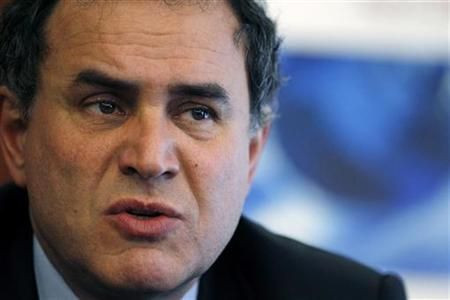Euro Zone Breakup in 2013? Roubini Thinks So

Economist Nouriel Roubini of Roubini Global Economics thinks a euro zone breakup could occur as soon as 2013.
In a CNBC interview Monday, Doctor Doom Roubini said the only answer for Greece -- to restore its growth, competitiveness and rebalance its economy -- is exiting the euro zone and devaluing a currency of its own.
As long as Greece stays in the euro zone and uses the euro, it cannot accomplish this, he said.
Roubini, who recently visited Athens, said there are 20,000 homeless people roaming the streets and protests occurring every day.
Greece's overall unemployment rate, according to December 2011 government data, is 21 percent. The youth unemployment rate is at an alarming 51 percent.
The recession is becoming a depression, said Roubini.
In the coming years, if peripheral euro zone countries do not grow, the bond market, instead of just worrying about their high levels of public debt, will also focus on their economic weakness, he said.
In this case, the bond market would continue to demand high interest on the countries' sovereign debts or reject them altogether. These euro zone members, therefore, may be forced to restructure their debt and exit the common currency, said Roubini.
Greece has already restructured its debt and reduced the amount owed by €100 billion ($130 billion). Roubini, however, thinks the country still cannot repay its debt and must restructure again and ultimately quit the euro zone.
The New York-based economist thinks Portugal may be next to restructure debt and then quit the euro, and that Ireland, Spain or Italy may eventually do so as well.
The Centre for Economic and Business Research, a UK think tank, is even more bearish than Roubini.
It now looks as though 2012 will be the year when the euro starts to break up, it stated on a document published in early January.
The CEBR put the probability of a euro zone breakup in 2012 at 60 percent. Within the next decade, it put the probability at 99 percent.
© Copyright IBTimes 2024. All rights reserved.





















